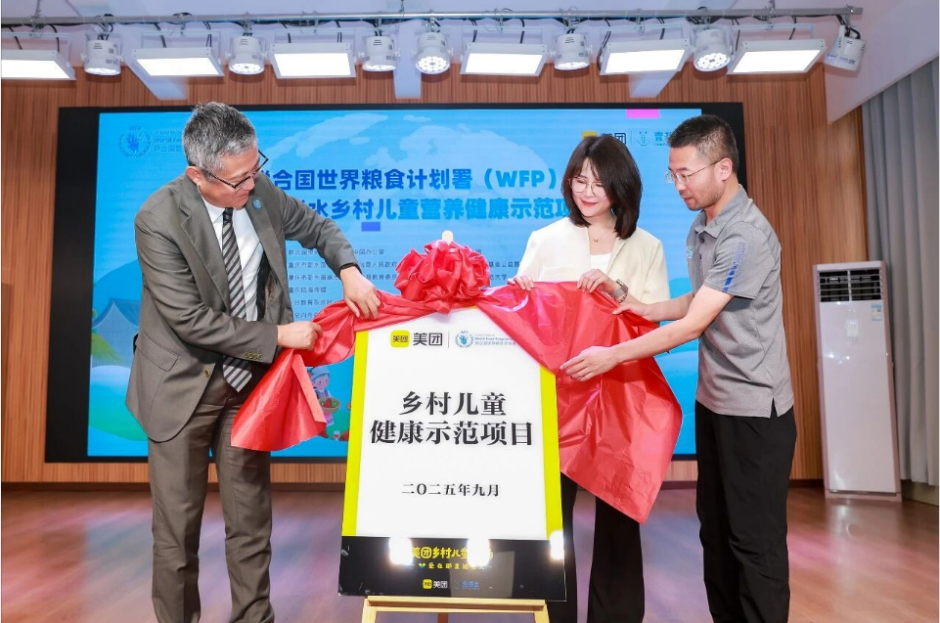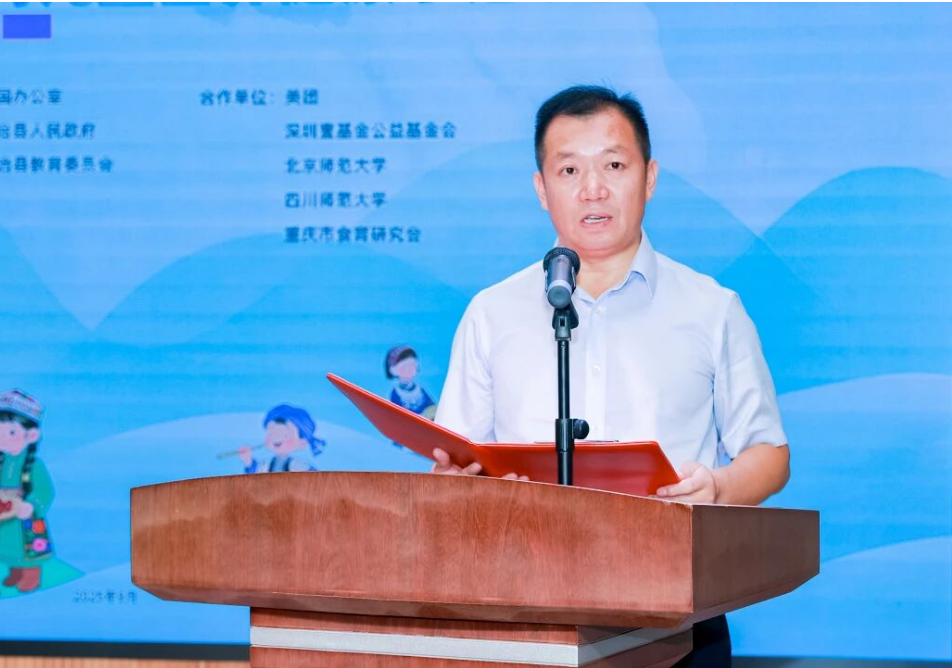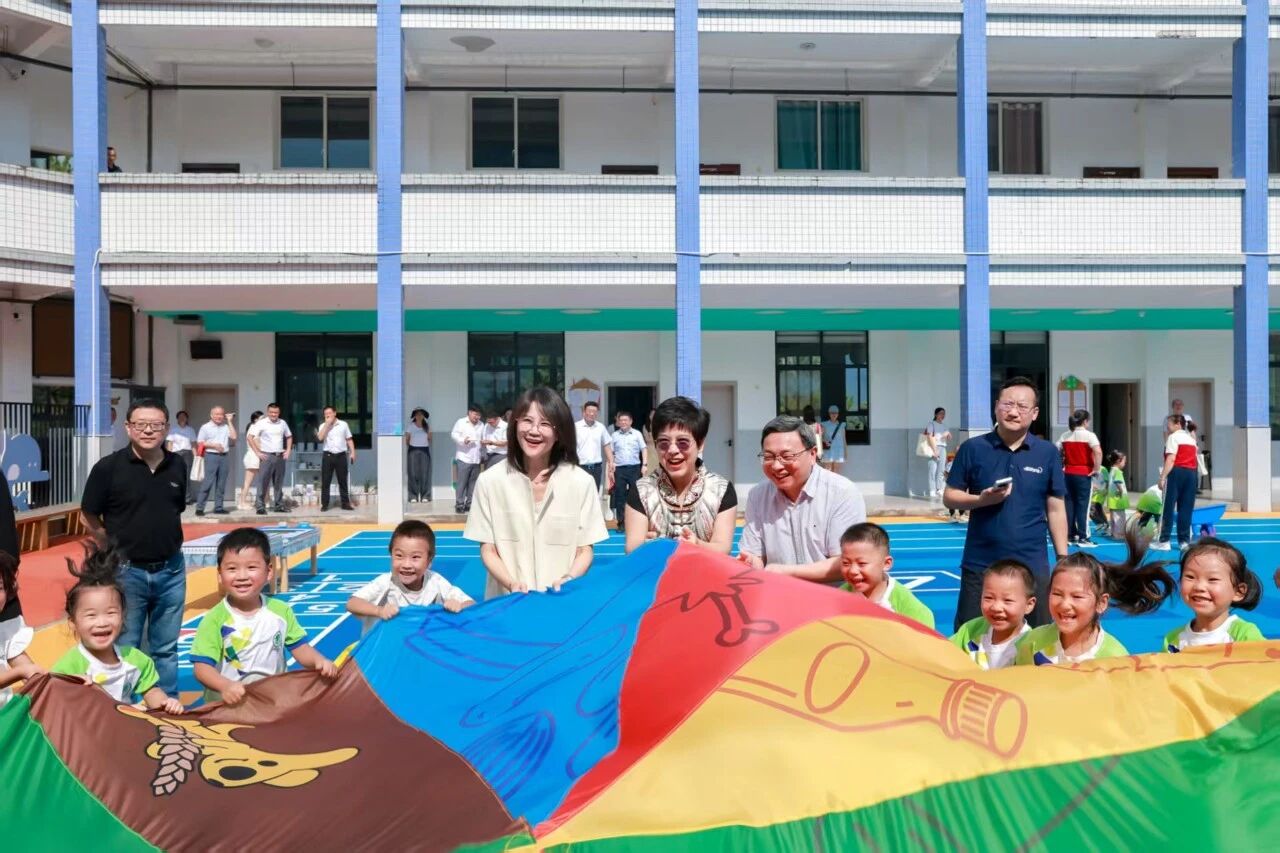On 2 September 2025, the Pengshui Rural Children’s Nutrition and Health Demonstration Project was officially launched at Lujiao Township Kindergarten in Pengshui Miao and Tujia Autonomous County, Chongqing City of China. The event was jointly organized by the World Food Program (WFP) China Office and the People’s Government of Pengshui County, the Meituan Foundation, and the One Foundation. It was attended by representatives from local authorities, enterprises, universities, and social organizations, reflecting the strong multi-sectoral commitment behind this demonstration initiative.

Speaking at the event, Zhao Bing, Representative and Director of WFP China Office, emphasized that nutrition and health are the foundation for every child to reach their full potential. He pointed out that children in Pengshui face the dual challenge of undernutrition and overnutrition, and this project provides a timely and targeted response. Zhao emphasized that the initiative is designed not only to address local needs, but also to serve as a model that can be replicated in other rural areas of China, contributing to the objectives of Healthy China 2030 and the national Rural Revitalization Strategy.

Zhao Bing, Representative and Director of WFP China Office, delivered a speech at the launch ceremony.
Ren Xiaoyun, Standing Committee Member of the Pengshui County Party Committee and Head of the Publicity Department, highlighted that the significance of the project lies not only in improving the physical health of around one thousand children but also in introducing expert-led evaluation, interactive learning, and systematic teacher training. This combination will provide sustainable support for children’s development.

Ren Xiaoyun, Standing Committee Member of the CPC Pengshui County Committee and Head of the Publicity Department, delivered a speech at the launch ceremony
Corporate and philanthropic partners also stressed their commitments. Zhou Lu, General Manager of Corporate Social Responsibility at Meituan and Secretary-General of the Meituan Foundation, described the project as an important step in leveraging Meituan’s digital and local networks to advance rural child health. Li Hong, Secretary-General of the One Foundation, underlined the role of philanthropy and expert resources in strengthening child-friendly environments, supporting teacher capacity-building, and ensuring rigorous evaluation.
The launch event included the unveiling of the project plaques, the donation of children’s publications by Chongqing Luhai Media, and interactive demonstrations of nutrition education games led by experts from Sichuan Normal University. Teachers attended training sessions on nutrition and health education, while children participated in playful learning activities, showcasing the project’s focus on integrating education with practice.

Through this launch, all partners expressed their commitment to making Pengshui a demonstration site for rural child nutrition and health improvement, with the long-term vision of expanding successful practices nationwide.
National and Local Context
The project responds directly to China’s National Nutrition Plan (2017–2030), the Healthy China 2030 Plan, and the Child Development Outline (2021–2030). These national strategies set clear targets for reducing anaemia and stunting in children, improving dietary quality, and promoting health equity between urban and rural populations.
Pengshui County, located in southeast Chongqing, facing challenges due to its mountainous geography, low household incomes, and limited urbanization. Children in the county experience both undernutrition, caused by monotonous diets lacking protein and micronutrients, and overnutrition, associated with rising consumption of oil and salt and reduced physical activity. Addressing these dual challenges is essential to improve child health outcomes and to break the intergenerational cycle of poverty.
Project Objectives
The demonstration project adopts an integrated approach, combining nutrition supplementation, physical activity interventions, and health education. Its objectives are threefold:
• To improve the nutritional status of young children by enhancing dietary diversity and ensuring regular milk consumption.
• To foster healthy lifestyle habits through structured play, community engagement, and family participation.
• To generate evidence that can inform national policy development and provide models for replication in other rural areas of China.
Target Population and Duration
The project covers eight township-level rural kindergartens. It is expected to benefit between 800 and 1,000 preschool children aged three to five years. The implementation period runs from June 2025 to June 2027, providing two full years of sustained interventions and comprehensive evaluation.
Nutrition Supplementation
The nutrition component provides each child with a daily portion of UHT milk for 360 school days per year. In addition, nutrition experts collaborate with schools to optimize school meal menus, ensuring that they comply with national dietary guidelines while incorporating local ingredients to enrich dietary diversity. This intervention builds upon existing government subsidies but addresses persistent gaps in protein and micronutrient intake.
Physical Activity Interventions
To improve access to safe and engaging exercise opportunities, the project is expanding facilities through the construction of new multifunctional playgrounds and the provision of sports kits. Teachers are trained to guide outdoor games and introduce the concept of balancing diet with physical activity. Community events, such as the “Village Kids’ Sports Day”, encourage children to adopt active lifestyles, while celebrity participation and public campaigns further promote the importance of exercise.
Nutrition and Health Education
Education is a central component of the project, reaching children, parents, and teachers alike. Preschoolers participate in interactive classes, creative workshops, and small-scale farming activities, which introduce the origins of food and teach the principles of balanced diets. Teachers receive training to strengthen their nutrition literacy and food safety knowledge, while parents take part in workshops that promote healthier family eating practices. The combination of school, family, and community approach ensures a broad and lasting impact.
Monitoring, Evaluation, and Policy Advocacy
The project is supported by a comprehensive monitoring and evaluation framework. Baseline and endline surveys, conducted in collaboration with Beijing Normal University, measure children’s growth and dietary intake as well as the knowledge, attitudes, and practices of teachers and parents. Findings will provide evidence for refining interventions and will contribute to national policy discussions on child nutrition and health. The evaluation will also serve as the basis for developing a scalable model for rural child health improvement across China.
Organizational Structure and Partnerships
The project is led by a coordination group established by the Pengshui County Government. The County Education Commission hosts the project management office, while the County Health Commission and the County Market Supervision Bureau provide technical support. WFP ensures overall guidance and supervision in line with international best practices. Corporate and philanthropic partners, including Meituan and the One Foundation, contribute resources, expertise, and outreach capacity, creating a collaborative model that integrates public, private, and non-profit sectors.
Conclusion
The launch of the Pengshui Child Nutrition and Health Demonstration Project marks an important step in advancing equitable health and development opportunities for children in rural China. By combining nutrition support, physical activity, and education, the project not only addresses immediate needs in Pengshui but also provides a practical model for future programmes across the country. With the joint commitment of government, international partners, private sector actors, and civil society, the initiative demonstrates how collaborative action can help secure a healthier and brighter future for the next generation.
Related Links:
2. Key Messages of China's Food and Nutrition Development Guideline (2025-2030)

